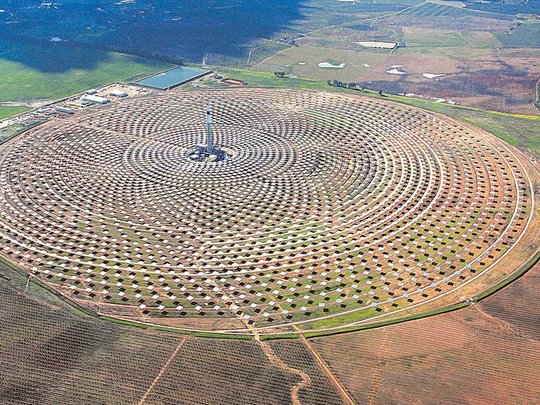
Let me say at the outset that I, as an oilman, am totally in support of the utilisation of renewable energy.
Because there is no single source of energy — be it oil, gas, coal and others — capable on its own to handle the growing world’s entire energy requirement.
There are other elements to consider, too, such as the need for clean air and environmental protection, improving the logistics of energy delivery and ensuring a higher level of energy security.
For oil-producing countries, there is the added advantage of reducing domestic consumption of oil and assigning higher volumes for export.
The proliferation of renewable energy has provided new jobs and skills to serve economic growth in many countries.
There is no doubt that renewable energy is growing fast in many countries and others are preparing to do the same.
The trend is encouraged by advances in technology, reduction in costs and governments’ policies to meet additional objectives on agreed targets for carbon emission and other objectives such as clean air in congested cities.
Hype vs reality
But the hype around renewable energy is probably much bigger than its achievement and is sometimes deceiving.
According to a report in oilprice.com, Longview Economics, a consultancy, said: “The rapid adoption of electric vehicles could cause oil prices to fall to $10 (Dh3.6) per barrel in less than a decade”.
Bloomberg New Energy Finance “predicts that EVs [electric vehicles] will capture more than half of all new auto sales by 2040”.
The same report suggests that Aramco’s initial public offering is because Saudi Arabia wants to monetise its oil before everything unravels.
We know that oil prices are sensitive and I could cite reasons why oil prices could go down to $10 a barrel ... as they did in 1986, for instance. But the advent of renewable energy and the increasing use of electric vehicles is unlikely to cause such an outcome.
By the numbers
The latest projection for the oil market by the US Energy Information Administration (EIA) tells us that demand for oil and other liquids is forecast to increase from around 95 million barrels a day (mbd) in 2015 to about 115 mbd in 2040.
The non-crude oil portion of liquids demand (biofuels, NGL and others) is about 20 mbd, and therefore net crude oil demand in 2040 would be 95 mbd.
Oil producers would have to work hard to provide this volume to avoid shortages and skyrocketing prices.
EIA forecasts world renewable energy to grow from about 38- to 76 equivalent mbd, which is a great leap forward but not enough to catch up with fossil fuels, especially oil which is forecast to still capture 56 per cent of the fuels in the transport sector.
Electric vehicles: Putting them in context
We know that many countries are strongly supporting the wide use of electric vehicles.
The IEA was quoted as saying “the 750,000 electric vehicles sold in 2016 are expected to reduce transport oil demand by around 0.02 per cent”.
The number is only 0.8 per cent of the total number of vehicles produced that year.
Therefore, it would take a long time before oil demand is substantially affected by the increasing use of EVs. This is not to belittle their impact, but only to put it in the proper context.
The recent report by IEA, Renewables 2017 tells us: “The share of renewables [ethanol and biodiesel] in road transport is expected to increase only marginally, from over 4 per cent in 2016 to almost 5 per cent in 2022”.
And, “Despite strongly rising sales, the share of EVs remains limited, and biofuels are still expected to represent over 90 per cent of total renewable energy consumption in road transport by 2022.”
Biofuel production in 2015 was around 2 mbd and “is expected to grow by over 16 per cent over the forecast period”, mainly in Brazil, US and Asia.
Welcome development
From the point of electricity consumption, the IEA says that “Globally, electricity consumed by EVs — including cars, two- and-three wheelers, and buses — is expected to double by 2022 but will still account for less than 1 per cent of total electricity generation.”
I believe that the enthusiasm for renewable energy in our region by some of the oil-producing countries such as Saudi Arabia, the UAE, Algeria and Egypt, and now Iran, is welcome.
The fear that the trend will contribute to the downfall of oil is greatly exaggerated. As is even accepting that its impact will be felt in the coming years.












